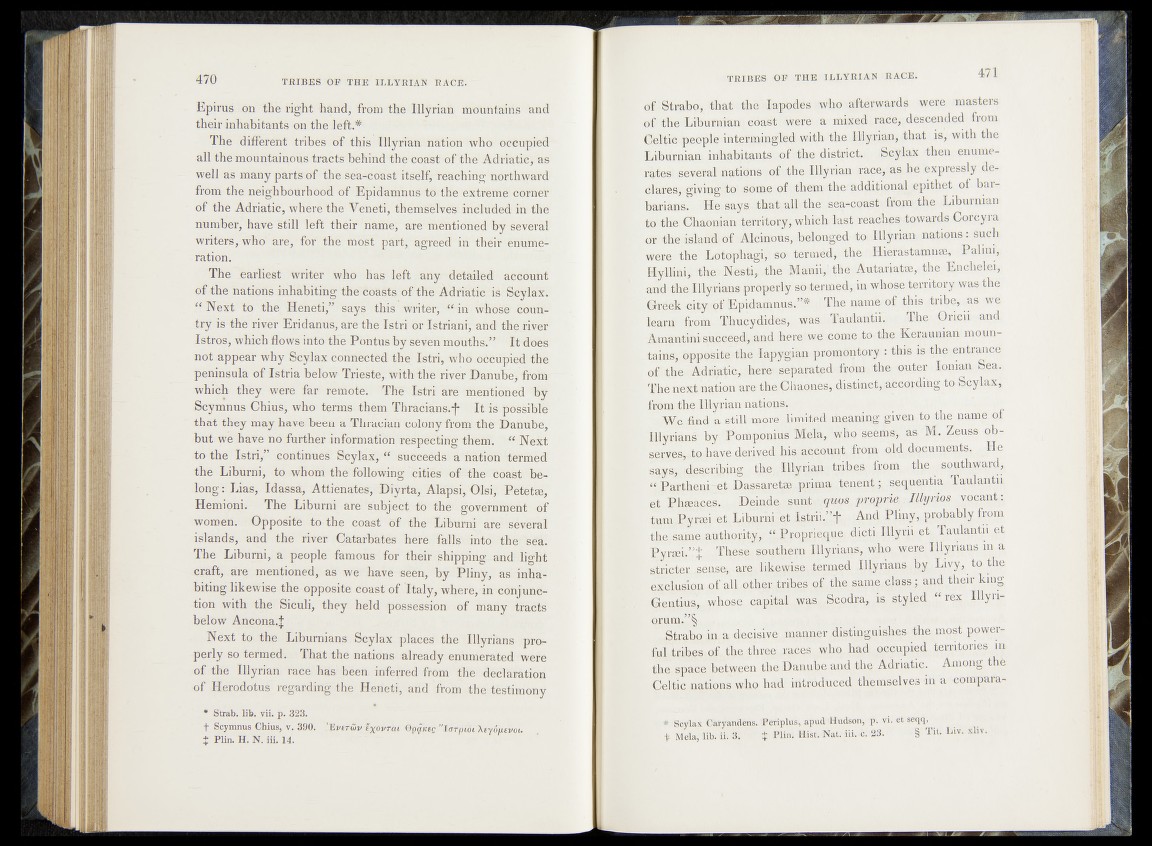
Epirus on the right hand, from the Illyrian mountains and
their inhabitants on the left.*
The different tribes of this Illyrian nation who occupied
all the mountainous tracts behind the coast of the Adriatic* as
well as many parts of the sea-coast itself, reaching northward
from the neighbourhood of Epidamnus to the extreme corner
of the Adriatic, where the Veneti, themSfelves included in the
number, have still left their name, are mentioned by several
writers, who are, for the most part, agreed in their énüme-
ration.
The pearliest writer who has left any detailed account
of the nations inhabiting the coasts of the Adriatic’is Scylax.
“ Next to the Henetr,” says this writer, “ in<whol&T cbuti-
try is-the river Eridarius, are the Istri or Istriani, and the river
Istros, which flows into the Pontus by seven mouths.” It does
not appear why Scylax connectèd the Istri, who occupied the
peninsula of Istria below Trieste, with the river Danube* from
which they were far remote; The Istri are mentioned' by
Scymnus Chius, who terms them Thracians.f It is possible
that they may have been a Thracian colony from the Danube,
but we have no further information ^respecting them. “ Nèxt
to the Istri,” continues Scylax, “ succeeds a nation" termed
the Liburni, to whom the following dftèsi-of-the-coaM' belong:
Lias, Idassa, Attienates, Diyrta, Alapsi, Olsi, Petefrn,
Hemioni. The Liburni are subject, to the government of
women. Opposite to the coast of the Liburni are several
islands, and the river Catarbates here falls ‘into the sea.
The Liburni, a people famous for their shipping- and light
craft, are mentioned, as we have seen, by Pliny, as inhabiting
likewise the-opposi te coast of Italy, where, in coni unction
with the Siculi, they held possession of many tracts
below Ancona.J
Next to the Libumians Scylax places the Illyrians properly
so termed. That the nations already enumerated were
of the Illyrian race has been inferred from the declaration
of Herodotus regarding the Heneti, and from the testimony
* Strab. lib. vii. p, 323.
f Scymnus Chius, v. 390. !$peru>v_ i \ p v T t i t QpqiKee ’' i o T p ^ i ^ s ^ é j i e v o i .
1 Plin. H. N. iii. 14.
of Strabo, that the lapodes who afterwards were masters
of the Liburnian coast were a mixed race, descended from
Celtic-people intermingled with- the Illyrian, that is, with the
Liburnian inhabitants of-the.-dist-ricL Scylax then enumerates;
several natidns -of the Illyrian race, as hd expressly declares,
giving to' some of them the? additional epithet of barbarian's.
He.says'- thatvaU^he,^sea-coast1 from the Liburnian
to’the, Chaonian territory, whidfelast reaches towards Corcyra
or the island .©£ Alcinous, beldng.e<hdphlllyr ian nations: Such
were the Loto;phagi,i So* termed, the Hierastamnae, ,-Palini,
Hyliini; the»'Nesti^the Manii,'the^utariatae, the Encfaehei,;
and the Illyriansproperly spiterMed, in whose territory was.the
©reek c it^ 'tp id a dm u s s .’f^j The name of this tribe, as we
learn.-1 from T h u c y d id e ^ ,^ T a u la n tii. The Oricjjbpand
Amantini shecedd^and .herei wd<$ ome,tdotshe, Keraunian mountains,
opposite" the Tupygian promdntpiy : th k i s |% p n trance
of the~ Adriatic,;-.her^^epacatpd;ifrdnil-,thef,^ l |^ - Ionian Sea.
The next nation arh'g^haon&s,Ai^%c£#f;QPLdi'ng •tp.'Sflfbix,
from,the lHyriann.atjrons-.,« t V •<* - : * fe $jj
We find a. -^illH^ire>,limited r h e ^ ^ l f e i j t o the namp of
Illyrians by Pbmpbnius Mela, 'who' segms,,|as JM. p-b-
-< smyes^toliave deriygd^illaccQujnt, from
fhe, Illyrian t r i ^ f o m j g g H g K
“ P a r th e r ^ t Das^aretse -prirna , tejynt ^ pe.qu^tia Taulaiitii
| | t Phs^g^a.^ •
tumPyrmj ;pt fr0 n
tbecame,anthority, “ Proprie^u^ *et
Pyraei.’fi | B S B | H | | I lly r ia ^ a
stricter ..pe^e,,, are 11 ke\jvi§e^|ei^med ^
exclusion of all »other .tribes of
Gentius, whose capital, .w a ^ l c p ^ ^ S ^ l e d ^ ^ r e x Illynorum.”
§ , p ■
Strabo in a decisive pnpnner d is ti^ g u i^ s t4he most P ° ^ |: ,
ful tribes of^the thrye.dapes who had^Gpipied, |terr|tprie|.in
the space between the Danube and the Adriatic. ' Among the
Celtic nations whd. had. intMdUced th ,qm se lv e s-a -eompara-
*-!®$Qa4 'jlj^»u^|S^|||t!riplus, apud Hudson, p. vi. et s^4«^e*'xL^
t M;ela,: li)kii. 3. £ tRUni ! ’ --I-Titi »is*, sliv-.'